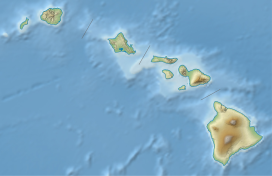Olomana (mountain)
| Olomana | |
|---|---|
| Mount Olomana | |
 View of the three peaks from Nu‘uanu Pali | |
| Highest point | |
| Elevation | 1,643 ft (501 m) |
| Coordinates | 21°21′51.00″N 157°45′13.00″W / 21.3641667°N 157.7536111°WCoordinates: 21°21′51.00″N 157°45′13.00″W / 21.3641667°N 157.7536111°W |
| Naming | |
| English translation | "Divided Hill" |
| Language of name | Hawaiian |
| Geography | |
 Olomana Windward Oahu, Honolulu County, Hawaii | |
| Geology | |
| Volcanic arc/belt | Hawaii hotspot |
| Climbing | |
| Easiest route | Hike |

Olomana is a set of three mountainous peaks on the windward side of Oahu near Kailua and Waimanalo. While historically only the first peak was called Olomana and the second and third Paku'i and Ahiki (the least pointed peak) respectively, most people call the entire section Olomana.[1] Geologically speaking, Olomana is an erosional remnant from within the caldera of the Koʻolau Volcano.
Legend[]
In Hawaiian, Olomana means, "divided hill". According to ancient Hawaiian legend, Olomana was a giant warrior who ruled the lands on the Windward side of Oahu from Kualoa to Makapu'u.[2] During this time ʻAhuapau, the king of Oahu sent the great warrior Palila to battle Olomana, subsequently cutting Olomana in half. His upper torso was said to be in the Pacific Ocean near Kāneʻohe Bay leaving his lower half where Mount Olomana is today.[2] According to the legend of Makalei, the peak Ahiki was named for one of Chief Olomana's favorite konohiki (headman), and the peak Pakuʻi was named for the keeper of Kaʻelepulu fishponds.[3]
Hiking trail[]
The trail that spans the three peaks is approximately 2.5 miles with an elevation gain of 1,643 feet. The terrain is rugged with many areas only passable with the aid of ropes.
Some of the more experienced hikers will challenge themselves by climbing without the assistance of ropes. This is not suggested as it is extremely dangerous.[4]
Accidents[]
Hiking Olomana can be hazardous especially in wet conditions between the second and third peak. In 2004 Jacqueline Turner, fell 150 feet but survived. Also on that day, another hiker, Mel Yoshioka, also fell while descending the backside of Olomana's second peak. He, too, survived.[5] In April 2011, 44-year-old Ryan Suenaga, an experienced hiker, fell to his death in this same area and in January 2014, 27-year-old off duty Honolulu Fireman Mitchell Kai fell to his death along the same section.[6] In June, 2015 a 52-year-old retired Navy man fell approx. 200 to his death, making it the 3rd casualty in 4 years on Olomana.[7] On April 1, 2018, a man was found 400 feet below the hiking trail. He was transferred by helicopter to a nearby park where he was pronounced dead. [8]
References[]
- ^ "Olomana in the clouds". Hawaiianforest.com. 2009-01-08. Retrieved 2010-07-27.
- ^ a b "Olomana, Another Ascent, Dayle Turner, Instructor at Leeward Community College". .hawaii.edu. Retrieved 2010-07-27.
- ^ Sterling, Elspeth P.; Summers, Catherine C. (1993). Sites of Oahu. Honolulu, HI: Bishop Museum Press. p. 234. ISBN 0-910240-73-6.
- ^ "The Hawaiian Trail and Mountain Club Trail Report - OLOMANA". Htmclub.org. Retrieved 2010-07-27.
- ^ "Tragedy on Olomana".
- ^ "Off-duty Honolulu firefighter dies after fall from Olomana trail".
- ^ "Hiker dies in fall at Olomana trail".
- ^ "Hiker dies in fall from Olomana Trail". April 2018.
External links[]
- Mountains of Hawaii
- Hawaii geography stubs
